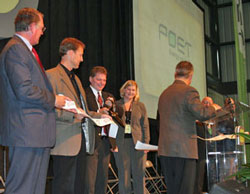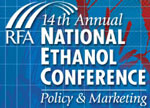 The world’s leading producer of camelina… a non-food oilseed… is teaming up with the University of North Dakota to produce biodiesel jet fuel from the grain.
The world’s leading producer of camelina… a non-food oilseed… is teaming up with the University of North Dakota to produce biodiesel jet fuel from the grain.
Great Plains – The Camelina Company and the Energy & Environmental Research Center (EERC) at UND have agreed to allow the EERC to use Great Plains’ proprietary technology to produce advanced fuels:
Great Plains has studied the science and agronomy of camelina for over 10 years and for the past three years has contracted with growers throughout the United States and Canada to grow the crop. Currently, the company is processing camelina seed to create biodiesel, but the EERC technology will maximize the biofuels potential for the crop.
The EERC has developed a feedstock-flexible process that can utilize various crop oils to produce combinations of jet fuel, diesel, gasoline, and propane that are identical to petroleum-derived fuels, enabling direct substitution with these fuels and providing renewable options across the spectrum of fuel needs.
“The EERC has strategically positioned itself to be the first to produce a truly sustainable renewable fuel that can be used the same way as traditional fuels with no special requirements,” said EERC Director Dr. Gerald Groenewold.
“This is an exciting opportunity for us and we can’t wait to hit the ground running,” says Sam Huttenbauer, CEO of Great Plains. “Not only is camelina a non-food crop, but it will also provide for an identical replacement of the traditional petrochemicals with the technology that the EERC has pioneered.”


 Here at Davis Debate Central once again tonight… OK, so it’s just my couch as I blog with my laptop on my lap and watch the Vice Presidential debate… as Democrat Sen. Joe Biden and Republican Gov. Sarah Palin duke it out.
Here at Davis Debate Central once again tonight… OK, so it’s just my couch as I blog with my laptop on my lap and watch the Vice Presidential debate… as Democrat Sen. Joe Biden and Republican Gov. Sarah Palin duke it out. POET became the largest producer of ethanol in Ohio this week with the grand opening ceremony for their second ethanol production facility in Fostoria. POET Biorefining – Fostoria is POET’s 25th ethanol plant.
POET became the largest producer of ethanol in Ohio this week with the grand opening ceremony for their second ethanol production facility in Fostoria. POET Biorefining – Fostoria is POET’s 25th ethanol plant. “It is always an exciting day when we can open another facility such as this that helps expand the ethanol industry,” said Ryan Hunter-Reay. “The industry has made great strides in the last few years and I am proud to be associated with it.”
“It is always an exciting day when we can open another facility such as this that helps expand the ethanol industry,” said Ryan Hunter-Reay. “The industry has made great strides in the last few years and I am proud to be associated with it.” Not only is the fuel they sell green, but a new biodiesel and ethanol station near Lake Tahoe, Nevada will be good for the environment as well.
Not only is the fuel they sell green, but a new biodiesel and ethanol station near Lake Tahoe, Nevada will be good for the environment as well. The fueling station is unique in that it has applied for LEED silver certification, a prestigious green building designation. Features include outdoor lighting that uses LED bulb technology, which reduces energy consumption up to 70 percent and reduces light pollution in the night sky. Solar tubes were installed in the restrooms to eliminate the need for daytime lighting along with flush toilets that reduce the amount of water consumed per use. Furnishings include cabinets made of fast-growing bamboo plywood and recycled countertops.
The fueling station is unique in that it has applied for LEED silver certification, a prestigious green building designation. Features include outdoor lighting that uses LED bulb technology, which reduces energy consumption up to 70 percent and reduces light pollution in the night sky. Solar tubes were installed in the restrooms to eliminate the need for daytime lighting along with flush toilets that reduce the amount of water consumed per use. Furnishings include cabinets made of fast-growing bamboo plywood and recycled countertops. “My administration will reduce the price of food by eliminating the subsidies for ethanol and agricultural goods,” McCain told an invitation-only group at the Harry Truman Library in Independence, Missouri. “These subsidies inflate the price of food, not only for Americans but for people in poverty across the world, and I propose to abolish them.”
“My administration will reduce the price of food by eliminating the subsidies for ethanol and agricultural goods,” McCain told an invitation-only group at the Harry Truman Library in Independence, Missouri. “These subsidies inflate the price of food, not only for Americans but for people in poverty across the world, and I propose to abolish them.” A hot rod built to run on hydrogen is expanding its horizons to run on another green fuel… ethanol.
A hot rod built to run on hydrogen is expanding its horizons to run on another green fuel… ethanol. The nation’s first intrastate public offering for the development of a wind project has had a successful completion… just four months after it was made available to the public.
The nation’s first intrastate public offering for the development of a wind project has had a successful completion… just four months after it was made available to the public. “Growing Innovation – America’s Energy Future Starts at Home” is the theme for the
“Growing Innovation – America’s Energy Future Starts at Home” is the theme for the  Registration is now underway for the event which promises to be bigger and better than ever in the big state of Texas with over 2500 attendees expected.
Registration is now underway for the event which promises to be bigger and better than ever in the big state of Texas with over 2500 attendees expected.  “The Challenge will show how flexible E85 is in today’s cars and shine a spotlight on how ethanol, known primarily for its environmental and economic contributions, is also a high octane product,” said Art Bunting, Illinois Corn Growers Association president.
“The Challenge will show how flexible E85 is in today’s cars and shine a spotlight on how ethanol, known primarily for its environmental and economic contributions, is also a high octane product,” said Art Bunting, Illinois Corn Growers Association president. “This is an important step towards providing Missouri consumers with new energy options that can offer both economic savings and improved fuel mileage,” said Gary Clark, Missouri Corn Growers Association (MCGA) senior director of marketing. “Our goal is to work with MDA and fuel retailers across the state to make sure proper and workable measurement standards are established while helping install locations where consumers can benefit from these mid-range ethanol blends.”
“This is an important step towards providing Missouri consumers with new energy options that can offer both economic savings and improved fuel mileage,” said Gary Clark, Missouri Corn Growers Association (MCGA) senior director of marketing. “Our goal is to work with MDA and fuel retailers across the state to make sure proper and workable measurement standards are established while helping install locations where consumers can benefit from these mid-range ethanol blends.”